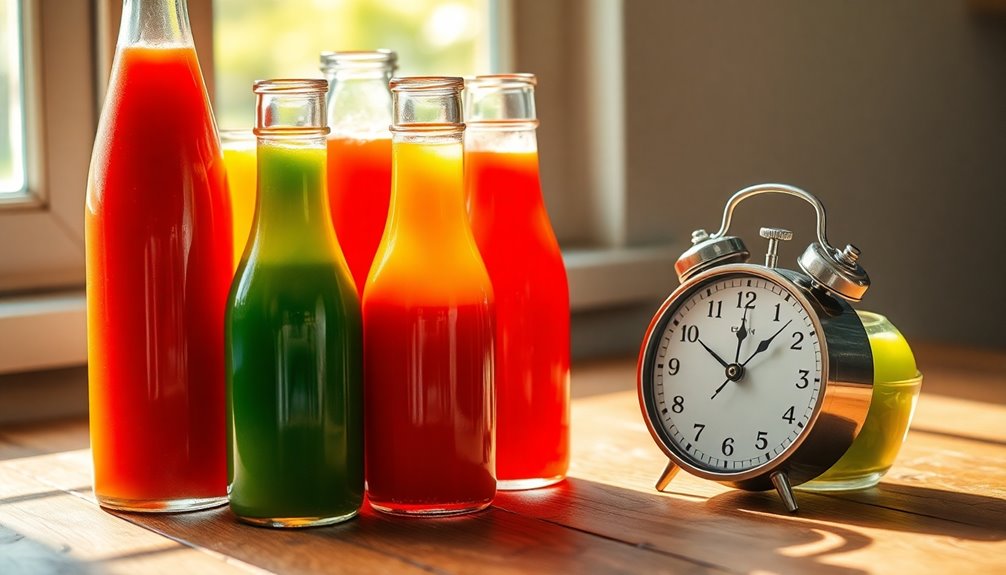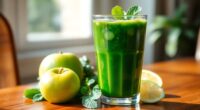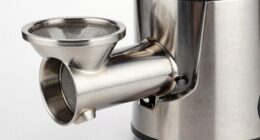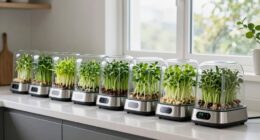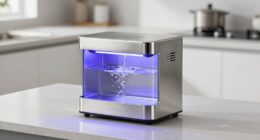Homemade juice can last anywhere from 24 hours to 5 days, depending on the juicing method you use. Centrifugal juicer juice stays fresh for up to 24 hours, while masticating and cold-pressed juicer juice can last up to 48 hours and 3-5 days, respectively. Proper storage in airtight containers at 35-40°F is key for longevity. You'll also discover tips to enhance juice freshness and prevent spoilage if you keep going!
Key Takeaways
- Juice from a centrifugal juicer lasts up to 24 hours, while masticating juice can last about 48 hours.
- Cold-pressed juice remains fresh for 3-5 days when stored in airtight containers.
- Always consume homemade juice within 72 hours for optimal taste and nutrition.
- Signs of spoilage include sour smells, dull color, unusual taste, or mold growth.
- Store juice at 35-40°F in glass containers to enhance freshness and prevent chemical leaching.
Understanding Juice Longevity
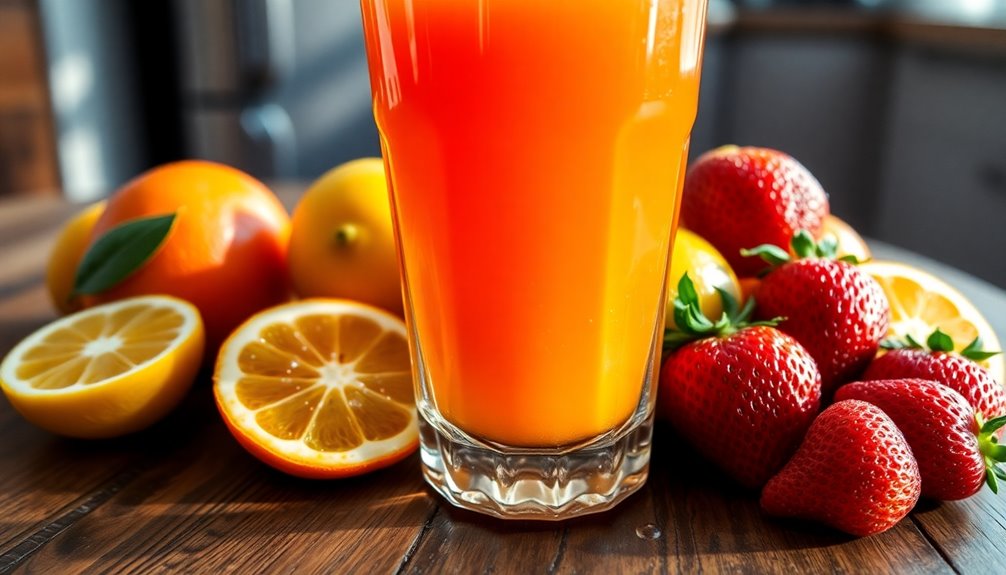
When you make homemade juice, understanding its lifespan is essential for enjoying the best flavor and nutrients.
The shelf life of fresh juice varies depending on your juicer; for instance, juice from a centrifugal juicer lasts up to 24 hours, while masticating juicer juice can last 48 hours, and twin gear juicer juice can extend the life to 4-5 days.
To minimize nutrient degradation, consume your juice within 72 hours. Proper storage in airtight glass containers at 35-40°F can help maintain freshness.
Adding citrus fruits like lemon acts as a natural preservative, slowing down oxidation. If you want even more longevity, consider freezing your homemade juice in small portions, which can last 2-3 months when stored correctly. Additionally, incorporating high antioxidant ingredients into your juice can further enhance its health benefits and shelf life.
The Impact of Juicing Methods
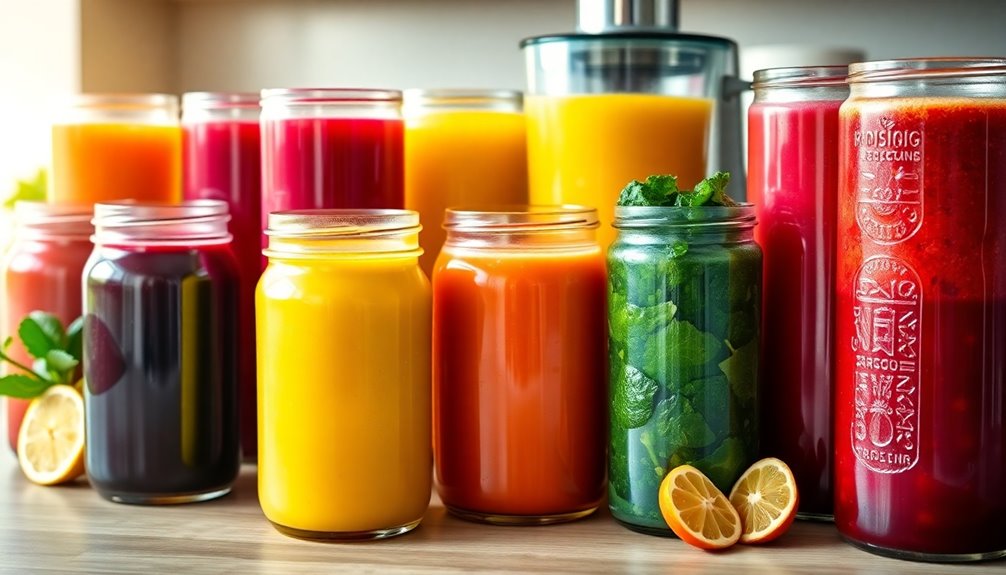
The method you choose for juicing can dramatically influence both the freshness and nutritional quality of your juice. Different juicing methods produce varying results in juice longevity and nutrient retention.
| Juicing Method | Juice Longevity | Nutritional Quality |
|---|---|---|
| Centrifugal Juicers | Up to 24 hours | Lower due to oxidation |
| Masticating Juicers | About 48 hours | Moderate retention |
| Twin Gear Juicers | 4-5 days | High retention, less air exposure |
| Cold-Press Juicers | 3-5 days | Highest nutrient retention |
Centrifugal juicers lead to quick oxidation, while masticating and twin gear juicers preserve freshness longer. Cold-press methods excel in both flavor and nutrient preservation, making them ideal for health-conscious juicers. Additionally, juices rich in vitamins A, C, and E can further enhance skin health and overall wellness.
Factors Influencing Freshness
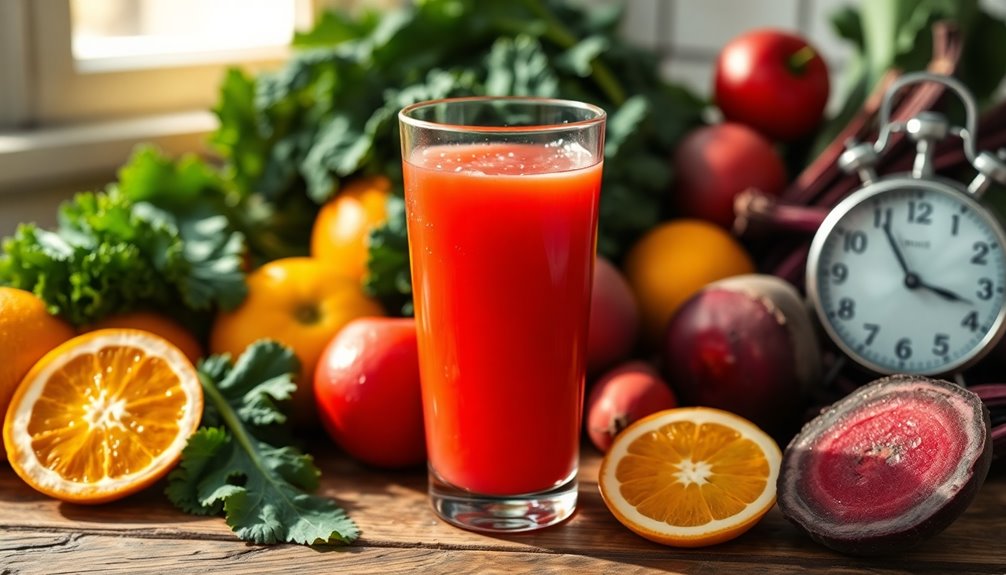
Freshness in homemade juice hinges on several key factors, starting with the type of juicer you use.
Centrifugal juicers cause faster oxidation, while masticating or twin gear juicers help maintain juice quality. The freshness of your produce plays a critical role too; using clean, high-quality ingredients leads to a longer shelf life.
During the juicing process, oxidation happens quickly, so consuming your juice immediately maximizes its freshness. Adding citrus fruits like lemon juice can serve as a natural preservative, slowing down oxidation and extending shelf life. Additionally, incorporating ingredients rich in omega-3 fatty acids can enhance the nutritional profile of your juice.
Finally, proper storage is essential. Use airtight containers and keep your juice at a temperature between 35-40°F (1.6-4.4°C) to preserve its vibrant freshness for as long as possible.
Best Practices for Storing Juice
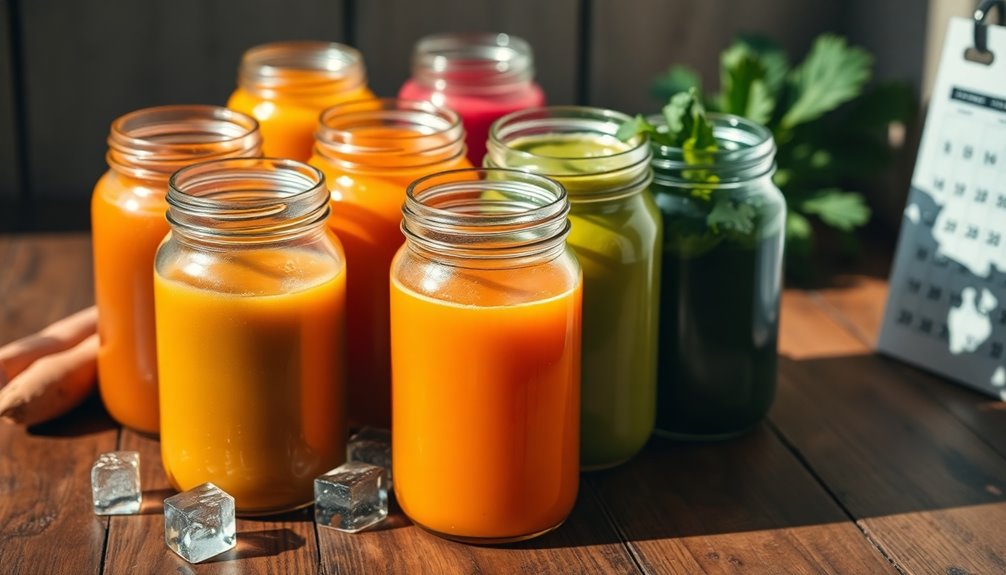
To keep your homemade juice fresh, always use airtight containers and store it at the right temperature.
Aim for a fridge setting of 35-40°F to slow down nutrient loss and oxidation.
If you want to extend the lifespan even further, consider freezing your juice for long-term storage.
Airtight Container Usage
When you store homemade juice, using an airtight container is essential for maintaining its quality and prolonging its lifespan. Airtight containers greatly limit exposure to oxygen, slowing down oxidation that leads to spoilage.
Opt for glass containers for juice storage, as they don't leach chemicals and preserve the juice's taste. To keep fresh, fill your containers to the brim before sealing them, minimizing air space.
Place your juice in the coldest part of the fridge, ideally at 35-40°F, to prevent bacteria growth. For even greater longevity, consider using vacuum-sealed bags or containers; this can extend the life of your juice to 5-7 days, helping to prolong freshness and retain its nutritional value. Additionally, incorporating unique homemade fruit juice recipes can provide diverse flavors while ensuring you consume a variety of nutrients.
Optimal Refrigeration Temperature
Maintaining the ideal refrigeration temperature for your homemade juice is essential for preserving its quality and nutritional benefits. The best refrigeration temperature ranges between 35-40°F (1.6-4.4°C), which helps slow nutrient degradation and prevents bacterial growth. To guarantee maximum taste and freshness, store your juice at the back of the fridge in an airtight container. This limits oxygen exposure and keeps your juice at a consistent temperature. Aim to consume your juice within 72 hours, but sooner is always better. Avoid placing it in the fridge door, where fluctuating temperatures can compromise quality.
| Temperature Range | Benefits | Tips |
|---|---|---|
| 35-40°F | Slows nutrient degradation | Store at the back of the fridge |
| Consistent temps | Prevents bacterial growth | Use an airtight container |
| 72 hours max | Maintains maximum taste | Consume sooner if possible |
Freezing for Longevity
Freezing your homemade juice not only extends its shelf life but also preserves its vibrant flavor and nutrients.
When freezing juice, consider using small portions, like ice cube trays or small containers, for easy thawing and usage. Always leave some space at the top of containers to allow for expansion, preventing spills or breakage.
Properly stored, your homemade juice can last up to 2-3 months while maintaining flavor and nutritional value. Don't forget to label freezer bags with the date of preparation to track freshness. Additionally, color accuracy is important in ensuring that the vibrant hues of your juice are retained even after freezing.
When it's time to enjoy your juice, avoid thawing juice in the microwave; instead, thaw it in the refrigerator overnight or at room temperature for the best results.
Essential Ingredients for Longer Shelf Life
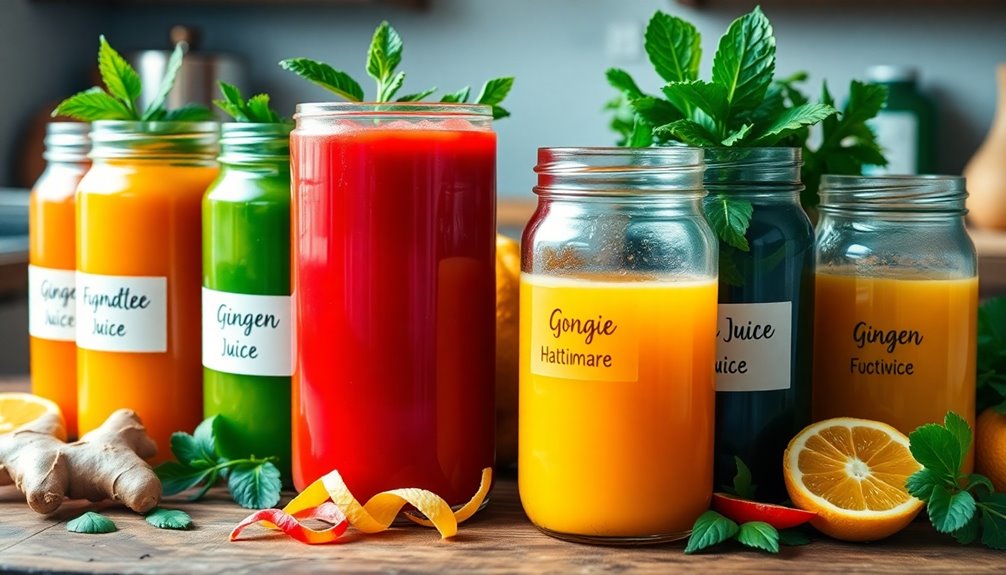
To extend the shelf life of your homemade juice, incorporating certain ingredients can make a considerable difference.
For example, adding citrus fruits like lemon or lime introduces Vitamin C, a natural preservative that helps delay the oxidation process and prolong freshness.
You can also use apple cider vinegar; its natural acidity inhibits bacterial growth, enhancing preservation.
Including ingredients with natural antimicrobial properties, such as ginger or turmeric, reduces spoilage risks.
Keeping some fiber in your juice helps slow down the oxidation process, allowing it to last longer.
Finally, using fresh, high-quality produce not only boosts flavor but also greatly improves juice shelf life, as older ingredients can hasten spoilage.
Additionally, consider adding chia seeds to your juice for their nutrient-dense profile, which can also promote health benefits while extending freshness.
With these essential ingredients, your juice lasts in the fridge much longer.
Techniques to Reduce Oxidation
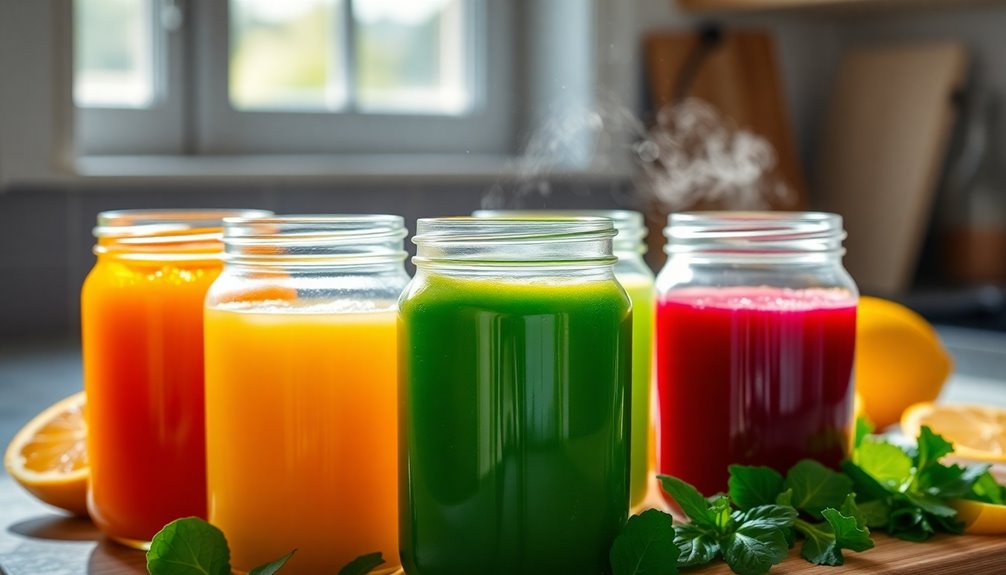
After you've added those key ingredients to enhance your juice's shelf life, it's time to focus on techniques that tackle oxidation directly.
To keep your homemade juice fresh, consider adding citrus fruits like lemon or lime. Their Vitamin C content acts as a natural preservative that helps delay oxidation.
Next, store your juice in airtight containers filled to the brim; this minimizes air exposure, essential for reducing oxidation.
If you want to take it a step further, utilize vacuum sealing techniques to remove any remaining air from the containers. Additionally, incorporating antioxidants in your diet can further support your body's defense against oxidative stress, enhancing overall health and wellness.
Ideal Temperature for Juice Storage
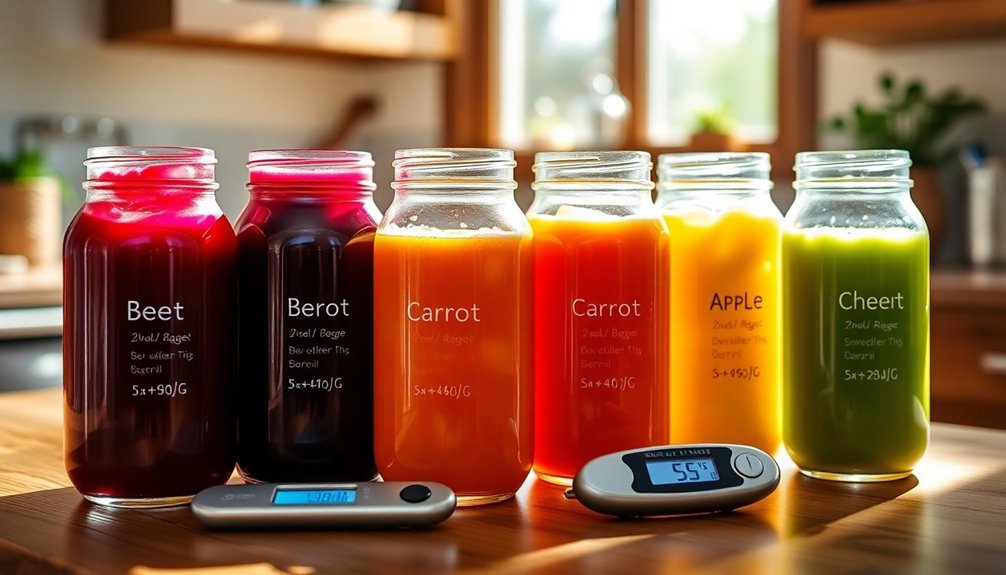
While it's tempting to store your homemade juice anywhere in the fridge, keeping it at the ideal temperature between 35-40°F (1.6-4.4°C) is essential for preserving its freshness.
This range helps slow nutrient degradation and prevents bacterial growth, ensuring your fresh juice stays safe and flavorful. For best juice storage, place your juice in the coldest part of the fridge, typically the back of the bottom shelf, where the temperature remains consistent.
Avoid rapid temperature fluctuations by keeping your juice away from the refrigerator door, which can expose it to warmer air each time you open it.
If you're traveling, consider using cooler bags with ice packs to maintain the best temperature and protect your juice's quality.
When to Consume Your Fresh Juice
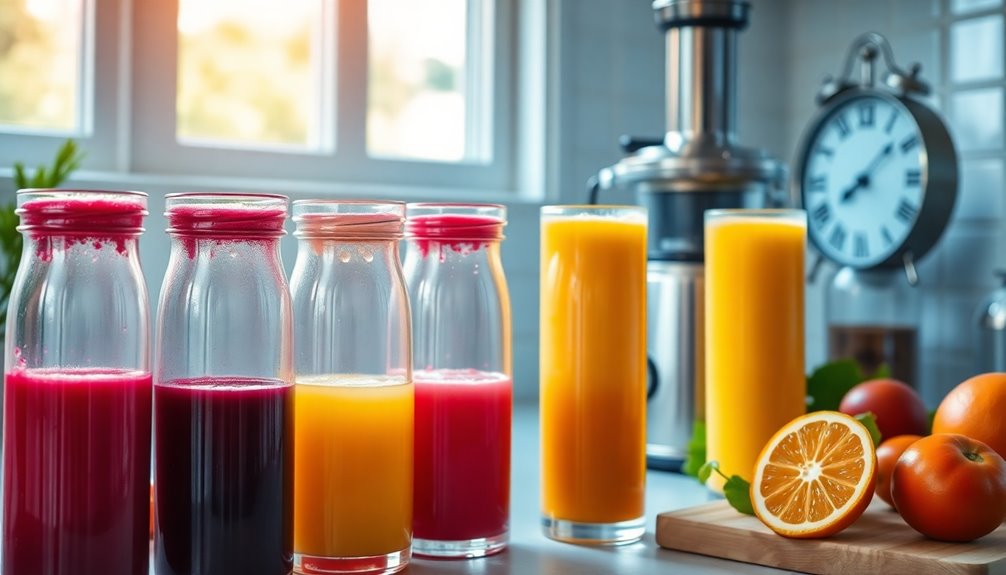
Consuming your fresh juice promptly is essential for enjoying its full nutritional benefits and vibrant flavor. To maximize these advantages, aim to drink your fresh juice within 15-30 minutes of preparation, as exposure to air and light can degrade the nutrients. Additionally, understanding the juice health benefits explained can guide you in selecting ingredients that target specific health goals, whether you’re looking for an energy boost or immune support. By making fresh juice a regular part of your diet, you can enjoy not only its delightful taste but also its rich array of vitamins and minerals.
Ideally, you should consume homemade juice within 24-72 hours after making it. Juice extracted with a centrifugal juicer will last up to 24 hours, while juice from a masticating juicer can stay fresh for about 48 hours.
Cold-pressed juice can last for 3-5 days if stored properly in an airtight container. To keep your juice fresh, make sure to refrigerate it right away.
Always check for signs of spoilage, like sour smells or a dull color, before drinking. Even if your juice hasn't reached its expiration date, don't hesitate to discard it if it shows any signs of spoilage.
Signs Your Juice Has Spoiled
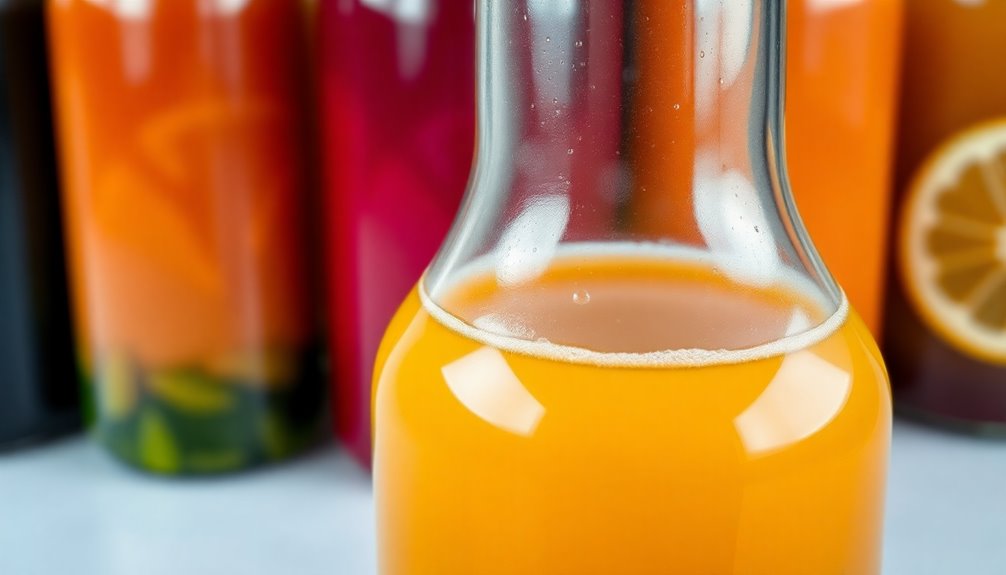
How can you tell if your fresh juice has spoiled? First, check for any sour smells that signal spoiled juice.
If the juice in the fridge has a dull color or an unusual taste, it's likely past its prime. Fresh juice can oxidize quickly, leading to a brown hue and a bitter flavor.
Mold growth on the surface is a clear sign of spoilage; discard it immediately to avoid health risks. If you notice a fermented smell, don't consume it, even if it looks fine. Additionally, like frozen yogurt, homemade juice can be a guilt-free dessert choice when consumed fresh, as it often contains natural ingredients that are beneficial for your health.
Tips for Enjoying Juice at Its Best
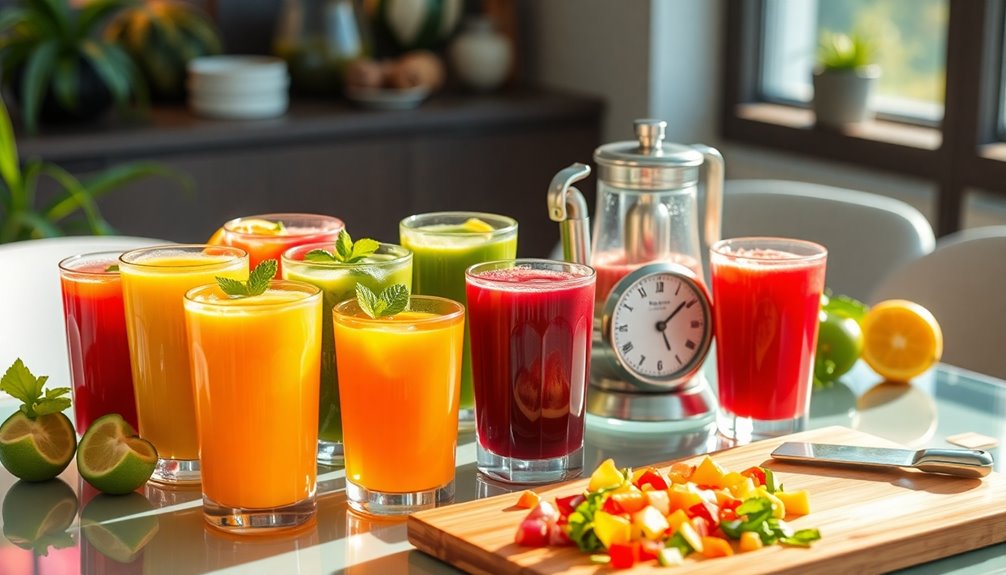
To enjoy your juice at its best, focus on consuming it within 72 hours of making it. This guarantees you get the maximum taste and nutritional benefits from that fresh stuff.
Store your juice in airtight containers at 35-40°F (1.6-4.4°C) to keep juice fresh longer and slow down bacterial growth. Adding lemon juice not only enhances the flavor but also introduces high acidity, acting as a natural preservative.
Fill the containers to the top to minimize air exposure, preserving the juice's vibrant color and taste. If you can't drink your juice right away, don't hesitate to freeze juice in small portions. Properly sealed, it can last up to 2-3 months while retaining its flavor and nutrients. Additionally, consider incorporating tropical fruits into your juice creations for an extra burst of flavor and nutrition.
Frequently Asked Questions
How Long Do Homemade Juices Stay Fresh?
Homemade juices usually stay fresh for varying durations.
If you use a centrifugal juicer, you've got about 24 hours, while a masticating juicer can keep them fresh for up to 48 hours.
For cold-pressed juices stored in airtight containers, you're looking at 3-5 days.
To maximize freshness, drink your juice within 72 hours and keep it between 35-40°F.
Adding lemon juice can also help preserve its flavor and nutrients.
How Long Does Juice Last in Mason Jars?
Ever wonder how long that revitalizing homemade juice you've made can last?
If you store it in mason jars, it can stay fresh for up to 72 hours in the fridge. Just make sure they're sealed tightly to minimize air exposure.
Fill them to the top to reduce oxidation, and keep the temperature between 35-40°F. A splash of lemon juice can also help extend its lifespan, acting as a natural preservative.
How Long Does It Take for Juice to Get Spoiled?
Juice can spoil relatively quickly, so you'll want to keep an eye on it.
Typically, freshly squeezed juice lasts about 3-4 days in an airtight container in the fridge. If you open it, consume it within 1-2 days.
Signs of spoilage include a sour smell, dull color, or off-taste. If you notice any mold, it's best to discard the juice immediately to avoid any health risks.
What Juices Have the Longest Shelf Life?
Ever wondered which juices last the longest?
Citrus juices like lemon and lime are your best bet, staying fresh for 5-7 days thanks to their acidity.
Cold-pressed juices, especially with high-acid ingredients, can last up to 3-5 days.
Meanwhile, vegetable juices, particularly those with root veggies, should be consumed within 24-48 hours.
If you freeze your juice in small portions, you can keep it for up to 6 months!
Conclusion
In the vibrant world of homemade juice, freshness is your best friend, while spoilage lurks in the shadows. By storing your juice correctly and choosing the right ingredients, you can enjoy that invigorating burst of flavor for days. Just imagine savoring a crisp, zingy sip today, instead of tossing out a sad, spoiled batch tomorrow. Embrace the art of juicing, and don't let a single drop go to waste—your taste buds and wallet will thank you!
Susannah expertise lies in researching and compiling evidence-based content on juicing, nutrition, and overall health. She is committed to ensuring that The Juicery World offers accurate, up-to-date, and trustworthy information to empower readers to take control of their health. Susannah’s goal is to inspire individuals to embrace juicing as a way to nourish their bodies and live their best lives.

